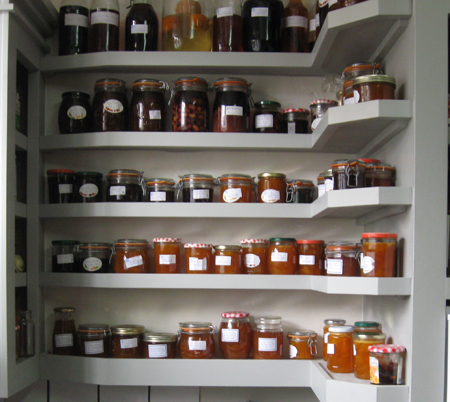Apricot Jam is up there with my favourites , Seville Orange and Quince being there too, so it was upsetting when my entire stash of this jam was finished off by hungry French breakfasters before Christmas last year in Le Presbytere.
Obviously I needed to do better this year.
The Apricots have just started to be sold here in the last couple of weeks , as always the first to arrive are the rosy cheeked Rousillion variety, very pretty and sweet but not the housewife’s choice for jam- too expensive for one and not tart enough for another.
I should explain at this stage that the making of Apricot jam is a strong tradition here in France. It is the breakfast confiture of choice , to the French what Seville Orange Marmalade is to the Irish and English.
Apricots carry the requisite amounts of both tartness and flavour which we all desire first thing in the morning.
Anyone raised in Ireland whose only contact with Apricot Jam has been through those nasty little packets of individual servings which taste of absolutely nothing could be forgiven for wondering what I am going on about. (that I was once offered this abomination in a four star hotel in a border county in Ireland showed a sort of contempt for customer which I can only hope no longer exists in Ireland)
We deposited the grandsons and their parents at Perpignan airport last Saturday and decided to meander home through Cathar country on the way back to Thezan. There , in a farm under Queribus Castle , we saw a sign for Apricots for sale. We headed off up a very bockety lane and got to a stylish barn where Monsieur was selling Apricots. There on display were some red Rousillon Apricots and another shiney looking variety. Both were an extremely reasonable €2.50 a kilo.
“Which” I asked him “would M. recommend for making confiture ?”
” Ah for confiture you need these ” said M. leading me to another part of the barn where some small underripe Apricots were stored.
“You will need to keep these for four days in a cool place to ripen properly , You have such a place ?”
I told him we had a cave.
He nodded in approval , he was willing to let his apricots go to a good home.
These cost only €1.50 for a kilo so I bought a large 10kg box for €15 and headed home.
Having kept the Apricots for their ripening time I went downstairs this morning, while the house slept, to make my jam.
They had indeed ripened up in the remaining days , even though I hadn’t put them in the cellar as instructed , but then we have been having an unseasonable spell of fresh weather lately.
I reckoned that about 6 of the ten kilos were ready to go and so I made up six potloads of jam. (I always make my jam up in kilo loads , I find larger amounts don’t work as well )
For every kilo of stoned apricots I added the juice of one lemon and one kilo of preserving sugar (this is freely available here , and back in Ireland, and is sugar with added citric acid and pectin)
My method is nearly always the same, I put the halved stoned fruit with the sugar and lemon juice into a large pot on my lowest possible heat and stirred it gently from time to time on this heat until the sugar was melted.
Then I put the pot on to my fastest ring and brought it to the boil, then when it was at a rolling boil I timed it for a precise five minutes (I tested the first batch for setting after that time so didn’t bother testing the remaining five) so after a couple of hours I had potted and shelved roughly 12 kilos of delicious Apricot Jam- about 24 jam jars full.

And to my immense satisfaction my Jam Shelves are again laden.

Comments
Petra
on June 8, 2011Oh what would I give for access to proper apricots!
Caroline@Bibliocook
on June 16, 2011Or a proper jam cupboard that I wouldn’t have to protect from inquisitive little fingers…
The comments are closed.